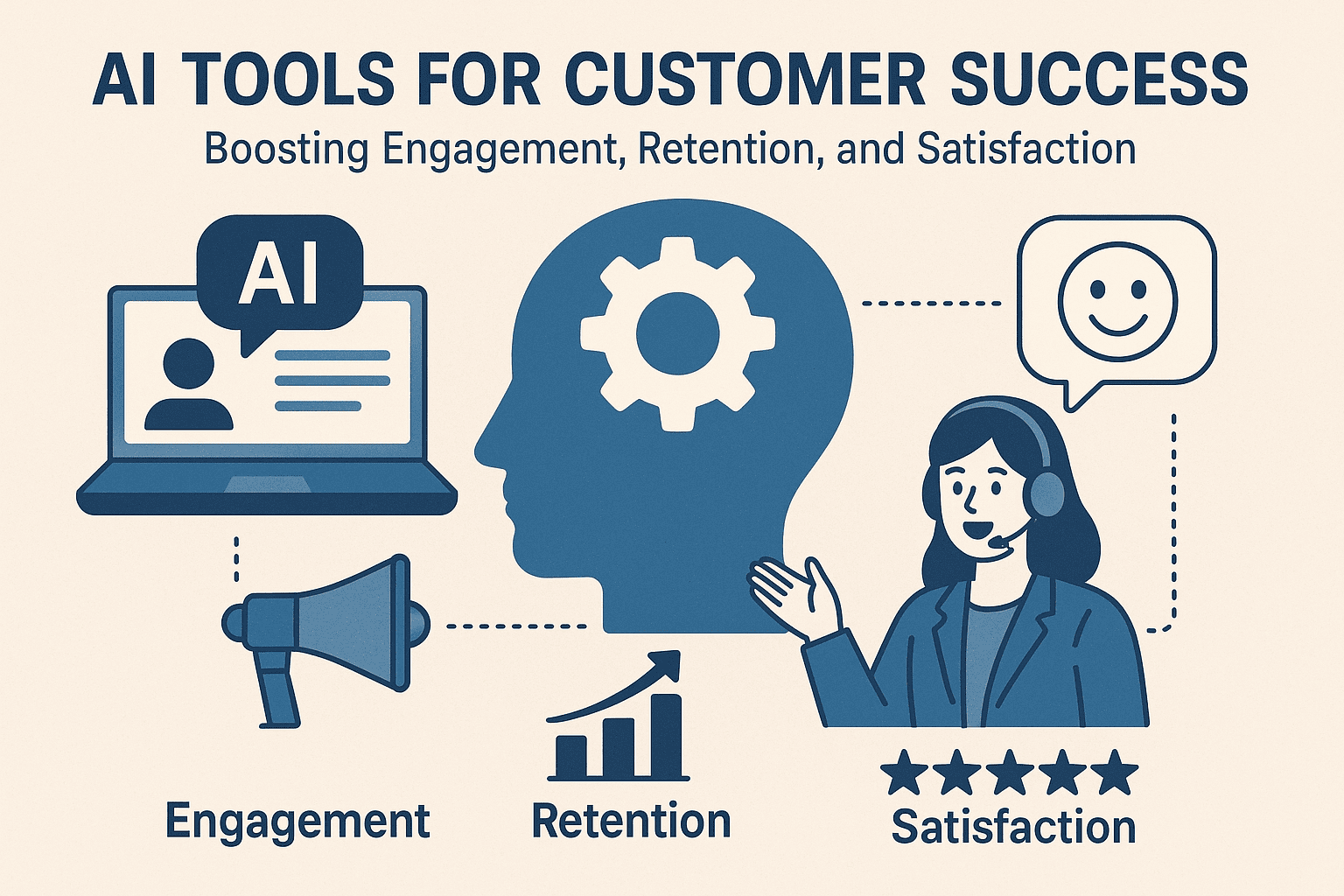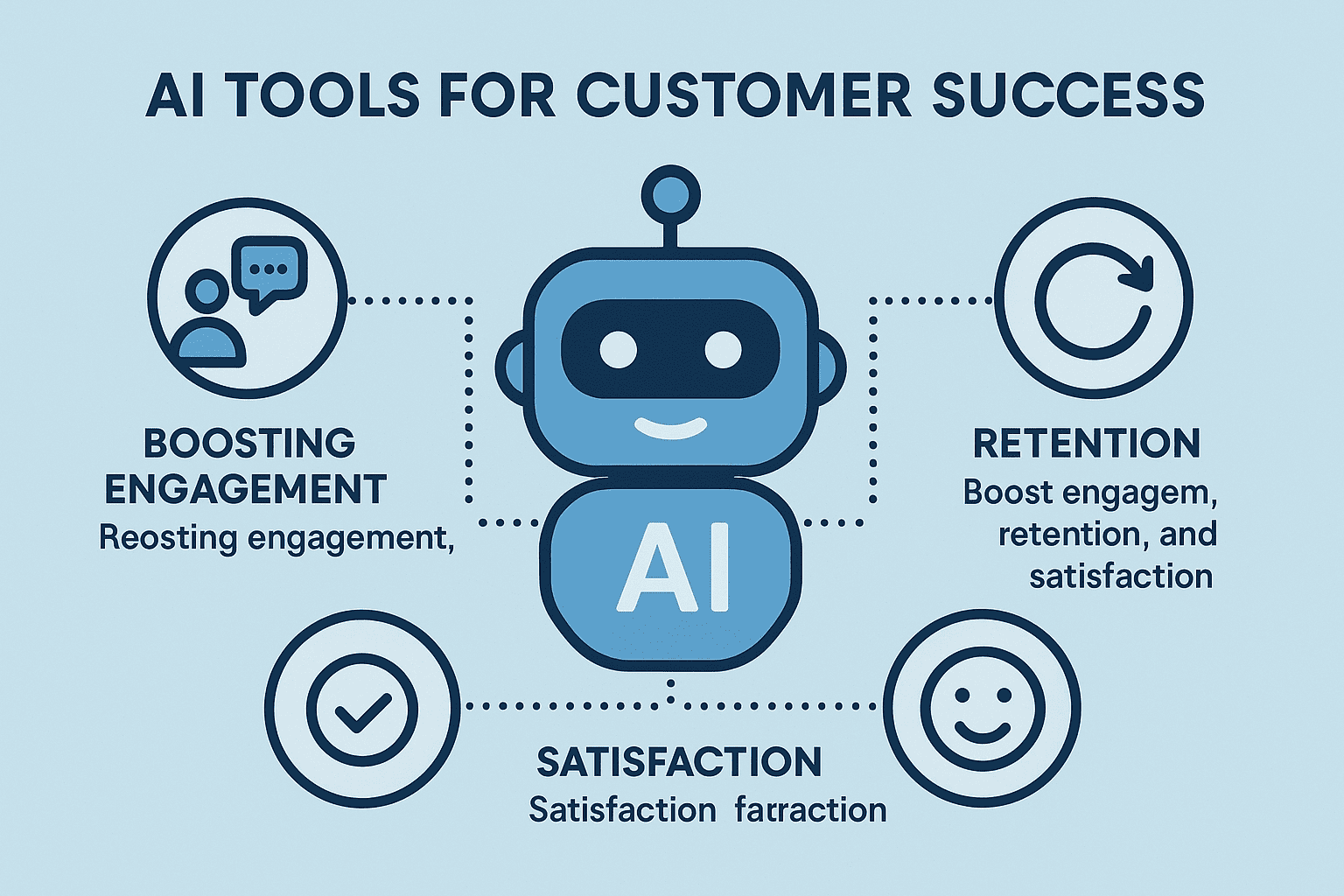
AI tools for customer success are transforming the way businesses retain customers, improve satisfaction, and reduce churn. In today’s customer-centric market, success doesn’t just depend on acquiring users. It hinges on keeping them happy and engaged. From predictive analytics to automated onboarding, AI is giving customer success teams a powerful edge. This guide explores the best tools and strategies in 2025 to help you get ahead.
Table of Contents
What Is Customer Success and Why It Matters?
Customer success refers to the strategy and processes businesses use to help customers achieve their desired outcomes with a product or service. It’s proactive, not reactive; unlike customer support, which deals with solving issues after they arise.
Effective customer success leads to:
- Higher customer retention rates
- Reduced churn
- Increased upsells and cross-sells
- Greater customer satisfaction and advocacy
Why Use AI for Customer Success?
AI is transforming how businesses manage customer relationships. Here’s why AI is critical for modern customer success strategies:
- Real-time insights: AI can analyze large volumes of customer data quickly.
- Predictive analytics: AI forecasts churn risks, product adoption trends, and customer behavior.
- 24/7 support: AI-powered chatbots provide instant help across time zones.
- Personalized communication: AI segments users and tailors content to increase engagement.
By leveraging AI tools for customer success, companies can make better decisions, automate repetitive tasks, and focus on building meaningful relationships.
Top AI Tools for Customer Success in 2025(Key AI Features)
| AI Tools | Key AI Features |
| Gainsight | 1. Predictive scoring to identify at-risk customers. 2. Churn analysis and renewal forecasting. 3. AI-driven customer segmentation. 4. Journey orchestration with personalization. |
| Totango | 1. Customer health prediction. 2. Real-time engagement tracking. 3. Automated outreach with AI-suggested content. 4. Intelligent alerts and task prioritization. |
| ChurnZero | 1. Churn prediction using behavioral data. 2. In-app communication tools for timely outreach. 3. AI recommendations for upsell opportunities. 4. Integration with CRM tools for unified customer views. |
| Zendesk AI | 1. AI bots for self-service and ticket deflection. 2. Customer sentiment analysis. 3. Workflow automation using triggers and rules. 4. Smart suggestions for support agents. |
| Freshsuccess by Freshworks | 1. Product usage insights. 2. Predictive scoring and lifecycle tracking. 3. Playbook automation. 4. Early warning signals for churn. |
| HubSpot Service Hub | 1. AI-powered chatbots. 2. Knowledge base and self-service automation. 3. Ticket routing based on intent. 4. Sentiment analysis and feedback loops. |
Best Practices for Implementing AI in Customer Success
- Define Clear Objectives: Before introducing AI tools, establish clear goals such as reducing churn, increasing product adoption, or improving customer satisfaction scores (CSAT). Align AI initiatives with your KPIs to measure ROI effectively.
- Ensure Data Quality and Integration: AI thrives on clean, accurate data. Integrate your CRM, product analytics, and customer support systems to give AI a complete picture of your customer journey.
- Start Small and Scale Gradually: Pilot AI in one area like onboarding automation or health scoring before rolling it out across departments. This reduces risk and builds team confidence.
- Keep Humans in the Loop: AI should augment, not replace, your CS team. Human judgment is still essential for relationship building and nuanced problem-solving.
- Monitor, Learn, and Iterate: Continuously track AI performance, gather feedback from teams and customers, and make data-driven adjustments to improve accuracy and value.
- Train Your Team: Provide training on how to interpret AI outputs and integrate insights into their daily workflows. This ensures adoption and trust in the system.

How AI Enhances Customer Success
| AI Capability | Customer Success Benefit |
| Churn Prediction Models | Flags behavioral patterns that suggest potential customer drop-off |
| Predictive Analytics | Identifies customers at risk of churn and enables proactive retention strategies. |
| Customer Health Scoring | Uses real-time data to determine which accounts need attention or upsell opportunities. |
| Chatbots & Virtual Assistants | Provides 24/7 support, resolves common queries instantly, reduces support workload. |
| Automated Workflows & Alerts | Triggers follow-ups, check-ins, and notifications without manual effort. |
| Sentiment Analysis | Analyzes customer feedback, support tickets, and reviews to assess satisfaction levels. |
| Natural Language Processing (NLP) | Understands and responds to customer communication more effectively. |
| Behavioral Analytics | Tracks product usage to improve user adoption and optimize feature utilization. |
| Knowledge Base Suggestions | Recommends relevant help articles automatically based on query context. |
Choosing the Right AI Customer Success Tool
- Business size: Choose scalable tools that grow with your company.
- Integration capabilities: Look for tools that sync with your CRM, email, and analytics stack.
- Ease of use: The platform should be intuitive for CS teams to adopt quickly.
- Customization options: Your CS process is unique; your tool should adapt to it.
- Customer support and onboarding: Ensure the vendor offers training and support.
FAQs:
Q1. Can AI tools completely replace customer success teams?
No. AI tools are best used to support and scale CS efforts by automating tasks and providing data-driven insights. Human connection is still vital.
Q2. What type of companies benefit most from AI in customer success?
SaaS, subscription services, e-commerce, and any company with a customer retention focus can benefit greatly.
Q3. Are AI tools for customer success expensive?
Costs vary. There are scalable solutions for small businesses as well as advanced tools for enterprises. Many tools offer tiered pricing.
Q4. How long does it take to implement AI Customer Success Tools?
Implementation time depends on the tool and your internal data infrastructure. With good planning, many tools can be integrated within weeks.
Q5. How does AI improve customer success strategies?
AI enhances customer success by predicting churn, automating routine tasks, personalizing customer journeys, and providing real-time insights. This helps teams act faster and deliver better customer experiences.
Final Thoughts
AI tools for customer success are no longer a futuristic concept, they’re essential for businesses that want to thrive in 2025 and beyond. Whether you’re a startup aiming to scale efficiently or an enterprise looking to streamline customer journeys, integrating AI into your customer success strategy can yield measurable improvements in retention, satisfaction, and revenue growth.
By leveraging platforms like Gainsight, Totango, ChurnZero, Zendesk AI, and HubSpot, businesses can turn customer success into a strategic growth driver.

